#IrisPriest
Text
‘You don’t want to get better’: the outdated treatment of ME/CFS patients is a national scandal | George Monbiot
‘You don’t want to get better’: the outdated treatment of ME/CFS patients is a national scandal | George Monbiot https://www.theguardian.com/commentisfree/2024/mar/12/chronic-fatigue-syndrome-me-treatments-social-services?CMP=share_btn_url
On another crash day, unable to leave bed, weighed down by the observations, assumptions and prejudices of people around me and by the total absence of support, recognition, or friends. Feelinf totally trapped and suicidal. This was a breath of fucking fresh air. Thanks George Monbiot. And thank you Post Exertional Mayonnaise for recommending.
3 notes
·
View notes
Text
The Oxford Real Farming Conference 2024 (ORFC24)
I have a sort of love-hate relationship with conferences. On the one hand, I always get swept away by the initial rush of excitement: a gathering of people, coming to exchange knowledge around a field we are all passionate about. On the other hand, for someone like me, the reality of conferences tends to be strange, isolating experiences dominated by academic, white, middle-class, cis people who speak a different language, with different values, and operate in a different world to me. Though I enter them full of excitement and curiosity, I usually leave feeling somewhat untethered, overwhelmed by theory and findings but bereft of community and thirsting for actionable, solutions-based approaches. I was delighted, therefore, when ORFC24 opened with a plenary of 10 speakers, all of them landworkers, from around the world, all of whom were extolling - in their own words and ways - action; solidarity; active hope; and calls for food, land, and sea sovereignty. It was clear from the outset this wasn’t going to be the ‘usual’ kind of conference (an abstract exploration of ideas and record of projects past) but a gathering of an international, multilingual, grassroots movement, rooted in an ethics of care and equality; working directly with the land on fairer systems of food and farming.
During the opening Plenary, Charlotte Dufour from Conscious Food Systems Alliance (CoFSA) invited us all - speakers, volunteers, and delegates, in Oxford and online - to take a moment to connect with the land, with one another, and to set an intention for the conference mindfully. In a busy programme of 45 sessions, featuring over 150 speakers and a busy stream of projects, opportunities, and conversations inundating social media, this invitation felt like a precious opportunity to gather focus, mitigate overwhelm, and ground ourselves. Sat at my kitchen table, some 330 miles away from Oxford, I set my intention: to seek out and learn from those at the frontlines of the struggle for Land, Food, and Environmental Justice. It didn’t take long for my intentions to be realised…
In the Thursday lunchtime session Colonised and Coloniser Transforming Relationships through Food and Land Stories Loa Niumeitolu, a displaced Indigenous Tongan, now living and working on Lisjan Ohlone Territory, California and Jessica Milgroom, a descendant of settler families, who grew up on Ojibwe reservation land in Northern Minnesota, held a conversation that aimed to “...break down hierarchies…to ask how we relate… how can we walk forwards together healing the wound of colonisation through food...” (JM). The conversation was one of honouring, compassion and bearing witness. As a white person living in the UK, for me it was also one of humility and unlearning: of coming to understand how our Western food systems are designed, founded and run on the violent displacement of indigenous people; the erasure of indigenous food systems; the severing of indigenous identity and everybody’s connections to the land. In some of her closing remarks Loa Niumeitolu invited the attendees to think differently about our identities and interconnectedness: “The sacred site IS the land… the land is an extension of our bodies… and we are all from indigenous people… we all have great great great grandparents who cared for, and stewarded, and loved the lands that we’re on…”. The session left me thinking about how it is people like myself can find our way back to our indigenous selves, to our ecological identities, and to the essential interbeing with the lands we live on. This conversation, conducted across the divide of coloniser and colonised, offered hope for how stories, conversations, and gatherings may start to unravel the systems of oppression and exploitation that industrial agriculture (aka the food arm of imperialist white supremacist capitalist patriarchy) extends around the world.
On the Friday morning session Building a Global Peasants Movement: 10 Years of Land Workers’ Alliance (LWA) and 30 Years of La Via Campesina (LVC) we heard from Jyoti Fernandes, Morgan Ody, Chukki Nanjundaswamy, and Paula Gioia themselves all land workers, farmers, peasants and indigenous peoples from around the world working both at the grassroots and international levels to oppose the neoliberal programme of WTO whilst also building international food sovereignty and land justice movements. It was a moving and eye-opening session led by women who - though it was never named - are all doing the vital repair work of rematriation.
Chukki Nanjundaswamy (Executive Chairperson of the Karnataka State Farmers Movement and co-coordinator of the All India Coordination Committee of Farmers Movements) traced the history of La Via Campesina (aka “Our Way” in Spanish) from its origins to the movement today which branches almost 100 countries and hundreds of local and national organizations “...fighting all kinds of imperialist and capitalist forces… for the right to food sovereignty”. She described how LVC is organised from the bottom up, constantly learning and evolving from the experiences of its members and other allies including the decision to ensure men and women were represented equally and at all levels of the movement. “LVC is not just about denouncing what we don’t want but also about building hope…across all sectors of society”.
Jyoti Fernandes (Campaigns and Policy Coordinator for the Landworkers’ Alliance) described “the family” of LWA, itself a member of LVC, and her reasons for co-founding LWA in the context of the UK where inequality and access to land have been yolked since the time of the enclosures. She explored the organic origins of the movement from pro-nature, anti-GM protests; to creative expressions of hope, solidarity and resistance; a shared belief in rights for natural home building, self and community sufficiency, and a collective realisation that “...there was this huge network of unorganised people… the neo peasantry returning to the land… and smallholder farmers… all facing evictions … and struggling to survive in the face of the neo-liberal paradigm the UK government was pushing onto farming…”. She described, with infectious joy, how LWA now regularly consult with DEFRA who recognise that LWA’s impetus of “Matching food production with biodiversity and looking after the climate…” is in everybody’s interests.
Paula Gioia (Facilitator of the Smallholder Farmers Constituency in the Civil Society and Indigenous Peoples Mechanism - CSIPM) talked about the intersectional work members of LVC had to undertake to develop a movement of radical change “… to fight against Capitalism and to fight against Patriarchy…this begins with self-reflection: how we reproduce Patriarchy in our daily lives… and this self-reflection begins with space… ” They described the women’s strike at of 1996 in Tlaxcala, Mexico during the 2nd International Conference of LVC in, which challenged the dominance of men, patriarchal ideas and attitudes in the movement whilst demanding; acknowledgement of the role women play in agriculture, farming, and society; 50 - 50 representation of men and women at all levels of LVC; a campaign highlighting and fighting violence against women and; the creation of spaces - now women’s assemblies - necessary for women’s ideas and voices to be supported by, and come forth through the movement.
Morgan Ody (General Coordinator of La Via Campesina, member of Confédération Paysanne and of the coordinating committee of ECVC) wearing the Palestinian keffiyeh around her shoulders spoke with clarity and passion about LVC's global accomplishments:
“… it is still illegal to crop GM crops in Europe, we fought for that… In Columbia, LVC is one of the main guarantors of the Peace Agreement… We have been the first to call for food sovereignty and now everybody is calling for food sovereignty…We have been pioneers of peasant feminism and now peasant feminism is growing everywhere… We have been able to negotiate the UN Declaration on the Rights of Peasants and other people working in rural areas (UNDROP)...” But Morgan’s talk didn’t end in the past, she spoke about how, in the face of multiple overlapping global crises, LVC offers alternative ways of being, of hope, of solidarity now and going forward “...Peasants…and all who are taking care of Mother Earth are the future...”.
She expressed grief and horror at the genocide happening in Palestine and the complicity of governments: “This is not acceptable and as La Via Campesina, we stand against this barbary, we stand for human values, we stand for human dignities, of whoever, of women, of non-binary people, of people whatever their religion or the colour of their skin. We are equal and we are equal in dignity...” This was a powerful reminder that land and environmental justice are inextricably intertwined with social justice and that we are all responsible for decolonising ourselves, for calling out and resisting imperial violence and oppression, wherever it happens in the world. But this session also spoke to how we are all responsible, not just for fighting the old, but also for cultivating the new: through solidarity, active hope, compassion, and creativity. As Morgan said in her closing comments “We are all responsible...for building a culture based on human rights and equality, intentionality, solidarity, and cooperation.”
The session was bookended with calls of “Viva La Via Campesina! Viva!”
In reflecting on these sessions of ORFC24, I started to think that healing is not the same as forgetting, but equally, it is not about flagellating ourselves or one another with past and current traumas - healing comes when we slow down, take time to sit with the pain and discomfort, to listen, learn, notice, and accept. This applies to ourselves, to those we have harmed, and to everyone (humans, land and more than humans alike). What both these sessions taught me is that when we share space and stories, when we listen deeply to one another and bear witness with compassion and empathy, we slowly start to arrive at a new understanding and to do the slow, gentle work of cultivating regenerative cultures based on reciprocity, healing and solidarity.
What I didn’t expect to happen as a consequence of volunteering at ORFC24 was that I would go away from the conference knowing more about myself…As someone who grew up in the English countryside but with no rights to access (we were a poor/working-class family living on a former miner’s terrace, surrounded by Grouse Moors and a large, tenanted estate) my relationship with the land was schismatic: though I felt a deep connection with the fells, moors, and rivers, I was also - according to the farmers, landowners and agents - an outsider. Worse, I was an illegal trespasser. I was surrounded by land which felt like home, like an extension of myself, only greater, deeper, older, more complex, more loving than I could comprehend. And yet, if caught swimming in the tarn, making dens on the fells, walking on the moors, or trudging through the heather, I would - at the very least - be shouted at and oftentimes, be warned away by the crack of shotgun fire. What ORFC24 and the incredible speakers made me realise is something that has taken me 30 years of unlearning to only start to understand: the necessary return to the land, the rediscovery of land-based life, something that I always yearned for but could never allow myself to imagine is not just a fantasy, it is a right. Listening to speakers on colonized lands, to those displaced by colonization and capitalism, to the LWA and LVC, I started to understand the violent inequality at the heart of our UK land and food systems. These speakers helped me see that I have the right to be on and with the land. Because there is no separation between us. I have always known, since I was a child, that myself and the land are one and the same, it was just educated out of me by our systems of inequality, land ownership and education. What the speakers at ORFC have helped me see is that my healing, and the healing of the land, are not separate but wholly, inextricably intertwined.
So now, to begin again, with gratitude and humility… The work of reconnecting and healing all our wounds…
Viva La Via Campesina!
Viva!
Iris Aspinall Priest, Tyne Valley
10.01.23
Word Count: 1985
#equality#solidarity#food sovereignty#LVC#LWA#land rights#indigenous rights#healing#animism#Qi#Nature#Resistance#Dignity#Human rights#traumarecovery#trauma#colonialism#capitalism#right to roam#irispriest
2 notes
·
View notes
Text
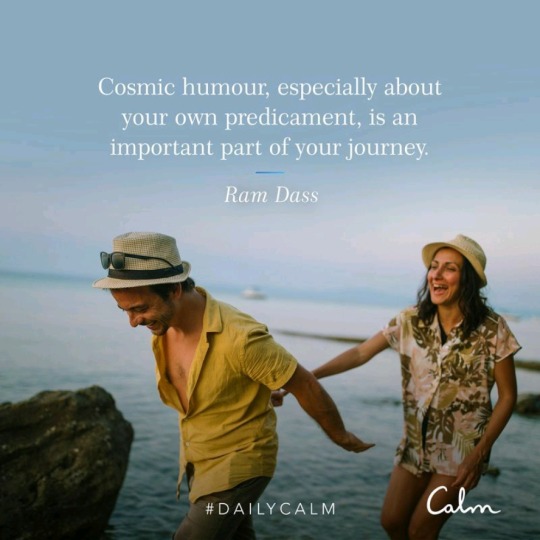
0 notes
Text
Permaculture Design Course
We dialled in from living rooms, bedrooms, caravans and gardens across 11 different time zones, from Abu Dhabi to California (with Brazil and Berlin somewhere in between). Our reasons for being here were all unique and yet all similar; concerns for the future; for the mass extinction event and loss of natural habitats; hoping to learn how to live sustainably; how to grow food naturally; how to produce more than we consume; how to change career; how to live without doing harm; and how to co-create a better world for our children and future generations to grow up in. In the context of one of the biggest worldwide pandemics in living history, this group of strangers met in the timeless hinterland of the online meeting room to explore, share, and learn about positive solutions both now and for our futures...
I stumbled across The Permaculture Design Course quite by accident (as I was looking for ways to make my struggling garden thrive rather than merely survive) but, over the course of a month, this unexpected experience changed my life completely... For the first time in 35 years I feel that I have been given access to a toolkit for living - a set of frameworks, processes and principles which speak entirely to what I feel and know to be real and right - for how to be and live in the world in deeply connected, holistic and sustainable ways... At a moment when I was feeling incredibly helpless and overwhelmed by global and personal circumstances, the PDC and this group of wonderful, disparate strangers, appeared “as if by magic” and turned around the whole way I understand myself, my power, and my place in the world. On my ‘rewriting trauma’ journey the PDC has been an invaluable turning point and has provided me with the maps and materials I most need (though may not have been looking for) for going forwards...
Since finishing the course I have been asked numerous times by friends, family and neighbours “What IS Permaculture, exactly...?” And I have responded with numerous answers (according to who was asking, their reasons for asking and the context in which the question was asked) but I would like to take this opportunity to address that question, in the best way I know how, through the precious and manifold ideas and conversations which came up throughout the course. I want to respond to the question “What is Permaculture?” in this way (rather than offer a singular narrative) because I believe this embodies and reflects much more of the essence of what Permaculture is : a set of principles, processes and frameworks for living which can be tailored to the particular and specific answers and solutions each one of us seeks in our own, unique context.
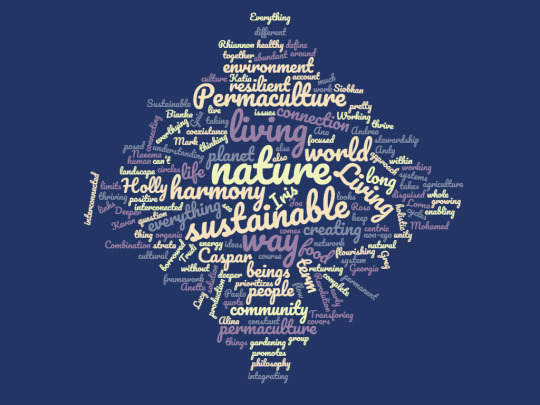
Word bubble formed from the PDC reactions to the question “How do you define Permaculture?” 2nd June 2020
“You can’t have sustainable food production without sustainable everything else.”
Graham Bell, Online PDC, June 2020
June 2020 was an astonishing and deeply challenging month in so many ways… Personally, I was forced to face the vulnerability of my own situation; my reliance on shop bought food and uncertain income streams when, at the very outset of lockdown, literally all of my work dried up, my partner was made redundant and access to food was scarce and difficult. Then there was worse to come. In the late hours of the 16th of June, my cousin Beth died. The news arrived during one of our PDC sessions. She had been battling secondary and primary breast cancer. This is a heartbreak and a loss I am still trying to understand and process (but one which, had I not been held by this group and this experience, would have been so much harder to deal with).
Meanwhile, on the international stage, people were facing so many additional threats and challenges posed by the Coronavirus Pandemic. The death statistics highlighted the social and economic inequalities, both at home and abroad, particularly along lines of race - with a disproportionate number of deaths and redundancies in people from BBIPOC (Black, Brown, Indigenous, People of Colour) backgrounds. We saw deaths in refugee camps sky rocketing. These statistics were a bitter salt in the wounds of exhaustive and institutional racism which we saw enacted again and again from the refugee crisis in Syria and Yemen to the police murders of George Floyd in Texas, Israel Berry in Oregon, Tracy Downe in Florida and many more besides… Some of us white folx, in waking up to the scale and pervasiveness of institutional and embedded violence towards our African, Asian and South East Asian Diaspora friends, that we (I) started to understand our (my) own white fragility and the systems of dis/advantage which many of us have been complicit in. And it was amidst this context of great uncertainty and upheaval that the PDC took place...
Over the course of the month of June, with three day-long zoom meetings a week and a handful of break out/additional sessions in between, we explored (amongst many things); the ideas and inspirations behind Permaculture; the centrality of Observation; Non Violent Communication; Patterns; Input & Output Analysis; Wild Design; Trees and Soil; Guilds - what they are, how they work, making our own; Arts and Culture(s); Landscape; Climate; Planning for the future; Alternative Exchange Economies; Food and Water; Six Coloured Thinking Hats; Plant Families and Nomenclature; Sociocracy; Healing; Cooperation vs Competition; Zones and Sectors; Needs, Wants and Offers… And many more things besides and between.
Though I was not aware of it at the time (though I might have been, had I read the curriculum and course handbook in advance!) almost the entire first half of the PDC was taken up with the co-creation of a safe and productive learning space and culture.
One of the first questions posed to the participants was from Kate Everett who asked “What makes learning work for you?”
I struggled to identify what had worked for me in the past but could instantly conjure what made learning not work: I thought of GCSE revision, 20 cups of tea a day, desperately cramming information into my head… I thought back to how long it had taken me to learn how to tie shoe laces or to put up a tent because of how much heat and anger there was from my father and his father that I couldn’t just do it… I thought of those feelings of shame, humiliation, stress and of shutting down when I was told I was an idiot and a failure… But then, interestingly, so many others in the group articulated similar experiences - “stress, school, competition”…Some people described themselves as lone wolves, others learnt better in groups, some benefited from working together over a problem or by sharing what they were learning… But what all of us agreed upon was the inhibiting effects of stress on learning and the need to enfold experimentation, play, overview and failure in order to make our learning journeys productive and engaging...
“Learning is love”
Graham Bell
Little did we know it at the time but all this information about our individual learning experiences was being observed, gathered and harvested… as we learnt about ourselves and one another we were also learning how to create the best learning (and hence growing) conditions for us as individuals and as a collective. Though we may not have fully realised it as it was happening, we are all in the “inverted classroom” : we had all become the teachers, as well as the students and would learn more from the collective than any single teacher or pedagogy could ever bestow...
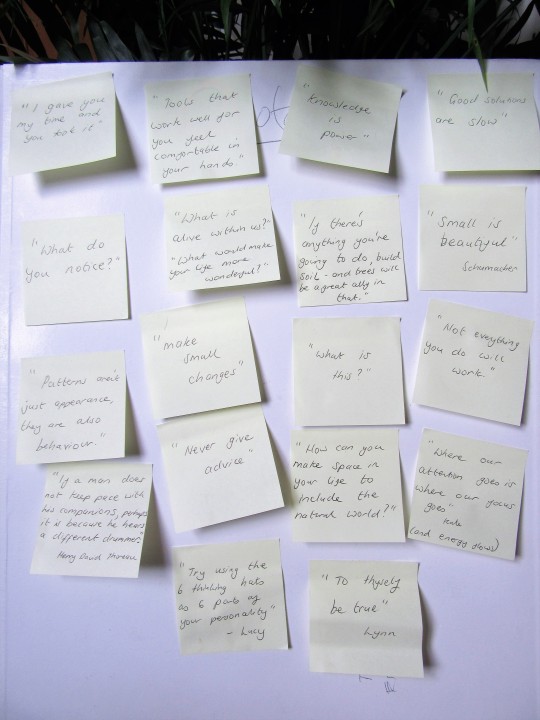
Quotes and prompts I collected throughout the course
“A person who doesn’t make a mistake probably doesn’t make anything”
Graham Bell
Mark Shiperlee introduced us to the concept of the Culture Board and we begin brain storming what factors are important to measure our course culture against. The factors we decided were of most importance to integrate into, and develop throughout, the course were;
Positive Solutions
Long & Short Breaks
Gift Economy
Time Keeping
Mutual Respect
Fun
Creativity
Task Setting & Reporting
Inclusion
Group Work
Connect With Nature
Throughout the course we would check in on the Culture Board regularly to determine what stage these various factors were at i.e. Seed; Sprout; Leaf; Flower; or Fruit. For me this was a valuable tool in understanding where the group felt our learning journey was at - which areas were working and which were not. It made this an easy, fluid and almost anonymised process and helped to address both the successes and the failures as we went along, understanding where energy needed focusing. This was one of many visual tools, along with The Life Ethics venn diagram, Six Thinking Hats, OBREDIMET, Looby’s Design Web, Input & Output Analysis, PMI (Plus, Minus, Interesting) Analysis, Importance/Urgency Matrix, and Relative Location which I have continued to use in my own Permaculture Life/Design Processes…
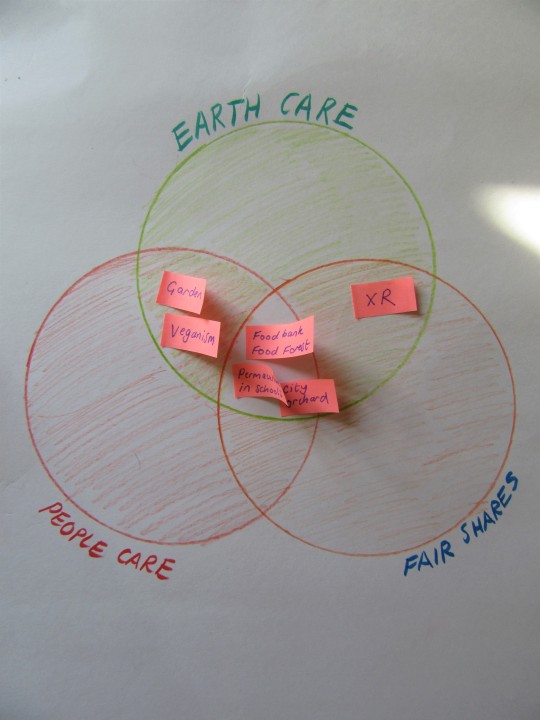
My LIfe Ethics Venn Diagram - i.e. the three main ethics of permaculture”Earth Care”, “People Care” and “Fair Shares” Where they all intersect is the core of Life Ethics
During the course we were also given our own break out Guild groups with whom we had to develop ad present a Permaculture Design Project with (below is ‘an artist’s impression’ of our Guild The Four Acorns - Lynn, Siobhan, Lucy and myself.
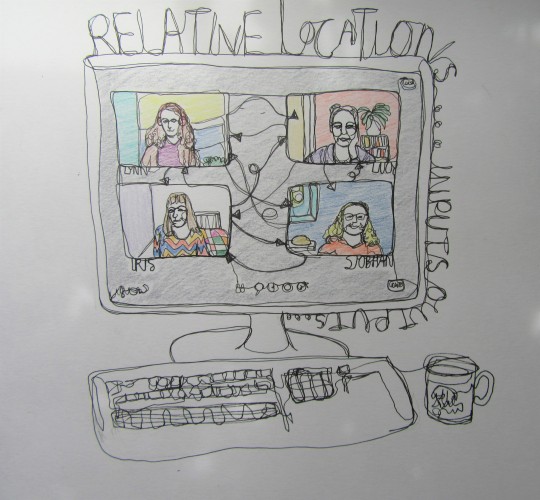
“Though the problems of the world are increasingly complex, the solutions remain embarrassingly simple”
Bill Mollison
By the third week of the course, with each one of our guild feeling exhausted by various life stresses (illness, work, family, bereavement, etc) we decided the best and most effective design we could work on was one for supporting each other as a guild whilst we embarked upon our permaculture journeys (the one thing which united all of us was that we wished to continue beyond the course).
We started applying some of the tools and processes we acquired throughout the course to our own visions for the future. We started off with Holmgren’s Permaculture Design Principles;
Principle 1. Observe & Interact
We began our guild process by gradually getting to know one another, developing & discussing project ideas that would tap into all of our needs & aspirations.
Principle 2.Catch & Store Energy
As we were all feeling a bit burnout we realised we needed to do something that would hold space and energy for us as individuals and a collective i.e. catch and store energy by making and holding space for one another. We wanted to encourage each other to feel safe enough to start exploring with new eyes and to assist each other’s courage in the face of major life changes.
Principle 3.Obtain a yield
We all wanted to carry on our development beyond the course and to share permaculture with others - so we asked the questions “How could we support one another in this?” But, in addition “What renewable resources and services did we have that we could use, share and apply?” and “What could we create - the main yield - within this guild?” We decided that the yield we could create in the present, but carrying into the future, was a space full of loving-support, inspiration, challenge and abundance.
Principle 4. Apply Self-regulation & accept feedback & Principle 5. Use & Value Renewable Resources and Services
As we began using permaculture tools to explore our individual designs, these processes enabled us to support and affirm one another; to share wisdom; tell stories; hear, value and integrate one another as individuals in a guild; become energised and strengthened by our diverse experiences, perspectives, knowledge(s), points of view; and to be challenged and strengthened by processes and making compassionate space for learning through failure too... And believe me, we did fail...
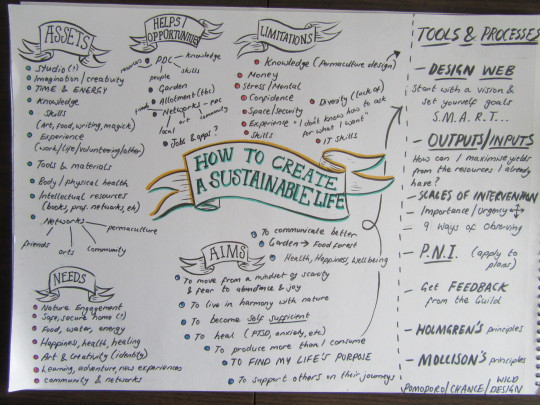
Mind Map at the outset of my own Permaculture Life Design exploring my assets, helps/opportunities, limitations, needs, aims and potential tools & processes to employ
“It takes shit... literal shit... but then you get humus”
Siobhan
On the last day of the course all of the individual guilds presented their design projects and it was amazing to see the wealth, depth and diversity of those ideas and the tools and processes (which we had been given throughout the course) put into action. There were design solutions that addressed; food scarcity; social isolation; mental health issues; segregation; alienation; loss of habitat and species; water shortages; poor health; access to education; job losses; seed sharing; community spaces; and so many more big issues. It was staggering.
In such a short space of time this small group of strangers had come together and, with the support of our guides and course leaders, co-created a network of support from across the world, positively enriching one another and the larger ecosystems each of us are a part of. It was a little island of paradise which cultivated an abundance of new perspectives, hope and courage. By showing us what might be possible and - rather than getting too mired in the negative/things we cannot control - looking to appreciate what we have, what we can be and what we can create together, the PDC taught us how diversity and collaboration can help us, both as individuals and a society, develop resilience in the face of the overwhelming challenges of our times.
It was an experience I will never forget and which I hope to keep alive as I go into the future (remembering to regularly use, sharpen and adapt those valuable tools)...
#permaculture#design#PDC#trauma#rewriting#collaboration#culture#diversity#solutions#growth#tools#futreproof#sustainability#food#growyourown#IrisPriest
2 notes
·
View notes
Photo
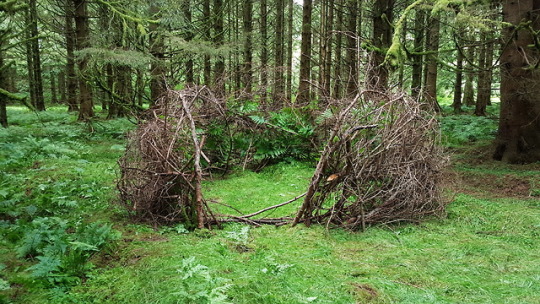
Home making <> Meaning making
0 notes